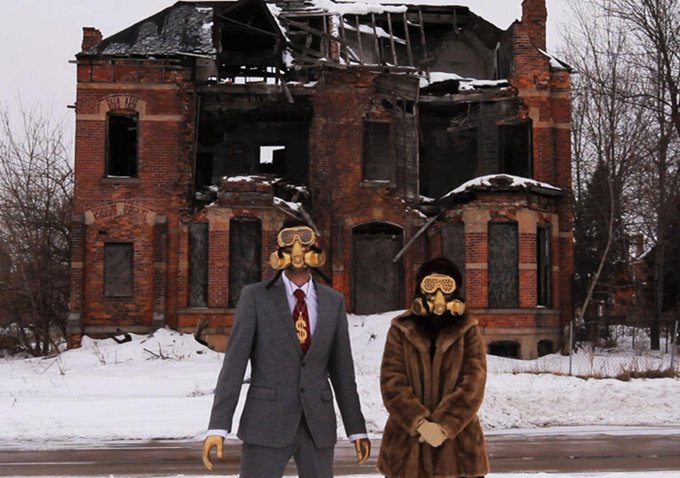 "Detropia" is more than just a portrait of a city. The latest film from "Jesus Camp" filmmakers Heidi Ewing and Rachel Grady is ultimately a moving and powerful micro-portrait of a hurting nation.
"Detropia" is more than just a portrait of a city. The latest film from "Jesus Camp" filmmakers Heidi Ewing and Rachel Grady is ultimately a moving and powerful micro-portrait of a hurting nation.
Detroit, a city built on the manufacturing boom, largely of the Ford, Chrysler, and General Motors companies — hence the nickname of “Motor City" — is emblematic of both America’s success and the failures that have caused its slow and steady decline. Ewing and Grady harness what is powerful about the documentary film medium what is largely absent from news reports and op-eds — the ability to create an empathetiic connection. Not that the film is a solution to America’s problems, but it is an eloquent and powerful awareness-builder.
 The opening scene, the demolition of an abandoned house covered by a local TV news crew, informs us it's one of many, and it sets the tone of decay and destruction the film carries. In short, this is Detroit today. The rest of the film is comprised of various personal stories of local Detroit residents, young and old, who have remained in the city, despite half its population fleeing. From a local blogger/waitress who explores the fascinating abandoned and decaying buildings around town, to a United Auto Workers chapter head trying to deal with an unfeeling auto industry who’ve found greener pastures in Mexico, to a a retired teacher turned blues bar owner trying to make ends meet, to a couple of young installation artists who've relocated from Hawaii, among others. The latter couple are one of the too-brief but bright spots in "Detropia," people who are actively moving to Detroit to take advantage of the lowered cost of living. The apparent influx of young people into the city is one of the interesting counterpoints to the doom and gloom of all the decay.
The opening scene, the demolition of an abandoned house covered by a local TV news crew, informs us it's one of many, and it sets the tone of decay and destruction the film carries. In short, this is Detroit today. The rest of the film is comprised of various personal stories of local Detroit residents, young and old, who have remained in the city, despite half its population fleeing. From a local blogger/waitress who explores the fascinating abandoned and decaying buildings around town, to a United Auto Workers chapter head trying to deal with an unfeeling auto industry who’ve found greener pastures in Mexico, to a a retired teacher turned blues bar owner trying to make ends meet, to a couple of young installation artists who've relocated from Hawaii, among others. The latter couple are one of the too-brief but bright spots in "Detropia," people who are actively moving to Detroit to take advantage of the lowered cost of living. The apparent influx of young people into the city is one of the interesting counterpoints to the doom and gloom of all the decay.
All too many of the residents realise that globalization and international competition is one of the main reasons behind Detroit's downfall. One of the most candid, yet beautifully captured, moments is of a group of young people tearing down an abandoned house for scrap metal to sell. They are all too aware of the irony of their task, ripping apart Detroit’s ruined buildings for dollars per pound of scrap to export to China, who will then sell it back to the USA as something new.
 Though the overall tone of the film is sombre, there is also a sense of ragged hope from many of the residents. The filmmakers also sit in on town meetings, where Mayor David Bing's plan to “downsize” or condense Detroit to better serve the remaining constituents is met with both outrage and proclamations of civic pride by the opponents of the proposal, who wish to maintain the integrity of the city they’ve lived in for so long. Also examined is the local opera company, another source of local pride, that has survived so far from auto industry patronage, but is now threatened with closure. The opera’s board has an engaging fighting spirit and determination to survive.
Though the overall tone of the film is sombre, there is also a sense of ragged hope from many of the residents. The filmmakers also sit in on town meetings, where Mayor David Bing's plan to “downsize” or condense Detroit to better serve the remaining constituents is met with both outrage and proclamations of civic pride by the opponents of the proposal, who wish to maintain the integrity of the city they’ve lived in for so long. Also examined is the local opera company, another source of local pride, that has survived so far from auto industry patronage, but is now threatened with closure. The opera’s board has an engaging fighting spirit and determination to survive.
There is an eerie and majestic beauty to this once great city, which is captured in gorgeous HD between stories. In a candid moment, some Swiss tourists who happen upon a cafe comment on the novelty of the ageing and rundown look of the city, compared to the stark “newness” of Switzerland. However, notably absent is much talk of the city's high crime rate, though unemployment is more thoroughly explored. But as gritty as "Detropia" is, it’s not investigative journalism — the film presents only a few facts and statistics, and it has no overarching narrative or narration to make the connection between the various personal stories, but instead, it allows the viewer to contemplate the subjective meaning behind what they are seeing.
A lyrical snapshot of a city on the brink, as well as a nation, "Detropia" is not only beautiful in form, but also a vital and affecting work, that hits close to home. [A-]

